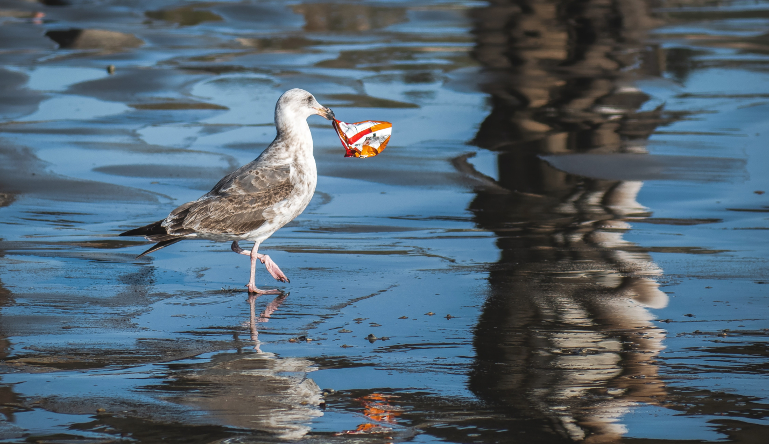Plastic waste or pollution?
Ottawa's single-use plastic ban faces its first legal challenge in Federal Court.

The federal government's first effort at regulating and reducing plastic pollution in the environment in the public interest was challenged in Federal Court last week.
The case was brought by the Responsible Plastic Use Coalition, a group that includes Imperial Oil, Dow Chemical and NOVA chemicals, along with more than 20 other plastic industry entities. At issue is the federal government's 2021 decision to add "plastic manufactured items" to the list of toxic substances under the Canadian Environmental Protection Act (CEPA).
On its website, the Coalition says the decision is "politically driven" and not based on science, as required under the Act, and "will have far-reaching consequences, including unintended consequences, nationally and internationally."
The Coalition wants to see the addition to the toxic substances list quashed on constitutional grounds, deeming it to be unreasonable and outside the enabling authority granted to the government by CEPA.
Under section 64 of CEPA, "toxic" is defined as risks that substances pose to the environment or human health. Listing plastics was the government's first step in curbing the problem of plastic pollution and meeting the Liberal campaign promise of zero plastic waste by 2030.
The government now has broad authority to implement additional regulations to keep the lid on plastics and mitigate their adverse effects. Drawing on that, Environment Minister Steven Guilbeault introduced regulations to ban the sale, import and production of six single-use plastic items – checkout bags, cutlery, food service ware, stir sticks and straws. Those took effect in December 2022 and the Coalition is challenging the measures in a separate case.
The toxic designation arose from growing concerns about how much plastic finds its way into the environment and wildlife. The listing order referenced Environment Canada data showing that in 2016, of the estimated 4,667 kilotonnes of plastic generated in Canada, 3,268 kilotonnes were discarded as waste and only 305 kilotonnes (9%) was recycled. The rest was incinerated, dumped in landfills or found its way into the environment as pollution.
In 2019, a study conducted by Deloitte found less than a tenth of the plastic waste produced in Canada is recycled. Each year saw 3.3 million tonnes of plastic thrown out – nearly half of which was plastic packaging.
There is no shortage of evidence of the harm caused by plastic waste. The government's science assessment, which reviewed more than 600 sources and studies to summarize the impacts of plastic pollution on the environment and human health, noted that "the improper management of plastic waste has led to plastics becoming ubiquitous in all major compartments of the environment."
The most common are single-use plastics, which kill and cause great suffering to wildlife – whales and seabirds. Every minute, the equivalent of one garbage truck of plastic enters the global oceans.
Kaitlyn Mitchell, a lawyer with Animal Justice Canada, says her organization intervened in the case to drive home the point that "when we talk about environmental harm from plastic pollution, we're talking about very real harm to animals in particular."
"Animals needlessly suffer and often die prolonged and painful deaths when they ingest or become entangled in plastics," she said. "We think it's very important for the court to understand the real on-the-ground impacts of plastic pollution, and why federal action is so urgently needed."
In 2019, 15.5 billion plastic grocery bags, 4.5 billion pieces of plastic cutlery, three billion stir sticks, 5.8 billion straws, 183 million six-pack rings and 805 million takeout containers were sold in Canada.
The Coalition says the challenge is plastic waste, not plastic itself. Further, it says society relies on plastic products to sustain everyday life, for use in eyeglasses, buildings, protective equipment, computers, medical devices and pipes that bring water into homes.
"From the gowns we're wearing in court, to the toothbrushes we use, to medical equipment used if we go to the hospital, all these plastic items are designated toxic by this order," Jennifer Danahy, counsel for the Coalition, told the court.
As it targets "plastic manufacturing items," the order encompasses everything, whether plastic is the final product or just a component.
"That is the essence of the overbreadth at the heart of this case […] The vast majority of items […] listed as toxic by this order don't even enter the environment as litter, let alone cause harm," she said.
As for plastic waste, the Coalition says waste management falls under provincial jurisdiction, which means the federal order is unconstitutional for intruding on that.
In September, the Alberta government announced it would intervene in the case, joining the American Chemistry Council, the American Fuel and Petrochemical Manufacturers and the government of Saskatchewan. In its submissions, the province said the order is an unconstitutional intrusion into provincial jurisdiction.
"Labelling plastic a 'toxic substance' is a direct threat to our economy and an intrusion into our jurisdiction that is having a negative impact on Alberta's petrochemical industry by creating uncertainty for employers and investors," Minister of Justice and Solicitor General Tyler Shandro said in a statement.
"Instead of making use of existing strategies to reduce waste and embrace the economic opportunities presented by recycling and reusing plastics, the federal government has chosen overreach instead."
However, Lindsay Beck, a lawyer with Ecojustice, who is intervening on behalf of Oceana Canada and Environmental Defence, says the listing order only targets plastic once it's pollution – outside the waste stream.
"That falls very much under the rubric of environmental protection, which is an area of shared jurisdiction between the provinces and the federal government," she said. "There's room for the federal government to regulate the polluting aspects of plastics, while the provinces maintain their jurisdiction over waste management."
The courts have been clear there is shared jurisdiction over the environment, says Mitchell. And when it comes to plastic pollution, "we're talking about very, very serious risks to the environment."
Given the harm plastic pollution causes animals, the shared federal-provincial jurisdiction over animal protection is also relevant. Section 91(27) of the Constitution Act sets out criminal law powers. One of the criminal law purposes is preventing needless suffering on the part of animals, says Mitchell.
For his part, Guilbeault is confident the government is on solid legal footing.
"We believe, and the evidence shows, that those plastics have very harmful impacts on the environment, on marine and sea creatures," he told reporters in Ottawa as the three-day hearing got underway in Toronto.
"And therefore, they can be labelled as toxic. I understand that (the Coalition) might disagree with that, but that is the conclusion to which we came, and then we're sticking to those conclusions."
Beck says her clients are hopeful the listing will be upheld, as it and the initial regulations are just the first step of many required to curb plastic pollution.
"What's really at stake is the fate of marine health across the country," Beck says.
"If the government is hamstrung from being able to regulate with respect to plastic pollution, it's going to be unable to reach its goal of zero plastic waste by 2030. And more importantly, it will be much more difficult to begin to get a grip on the huge harm that plastics are causing in oceans, beaches, and landfills."


